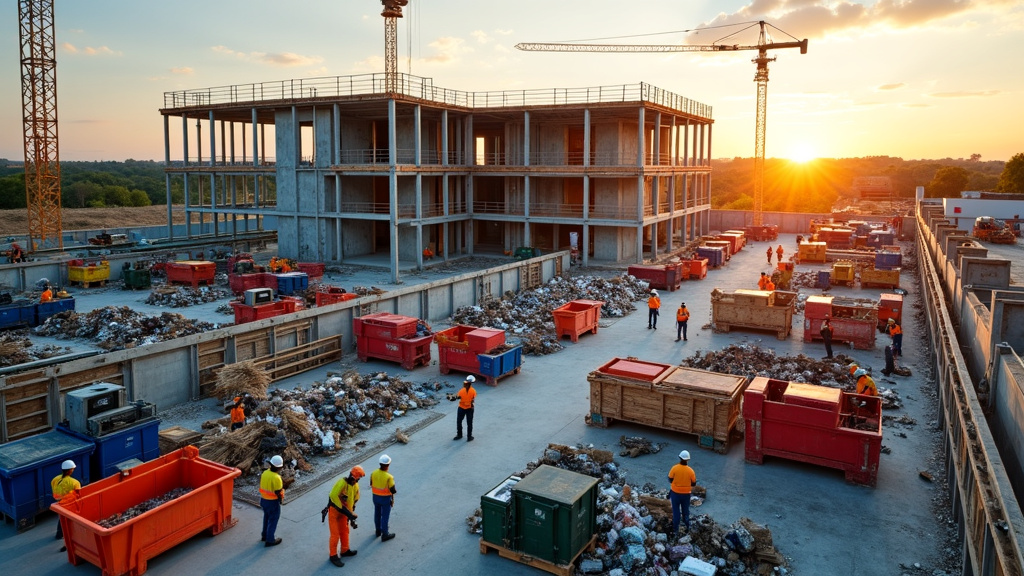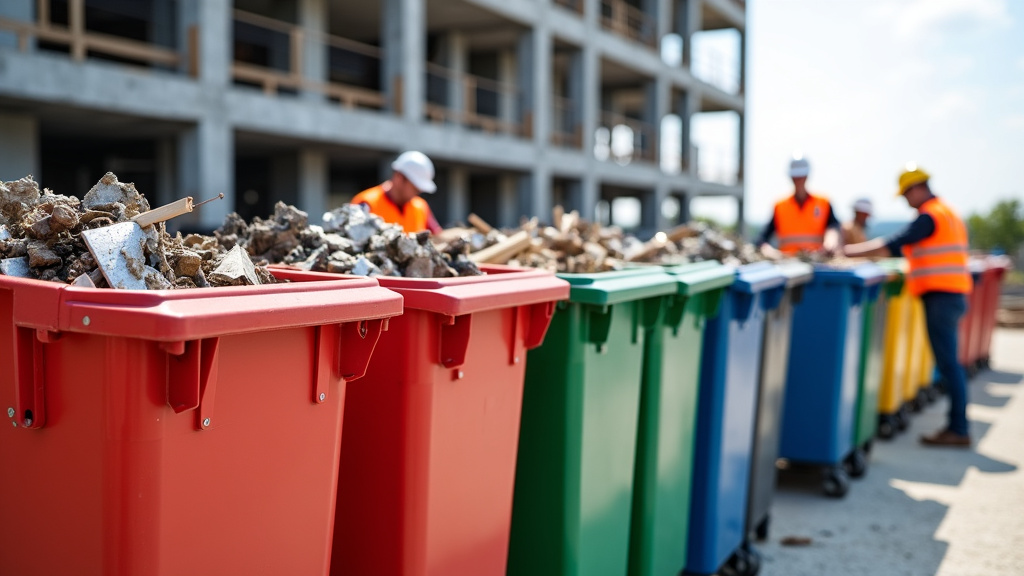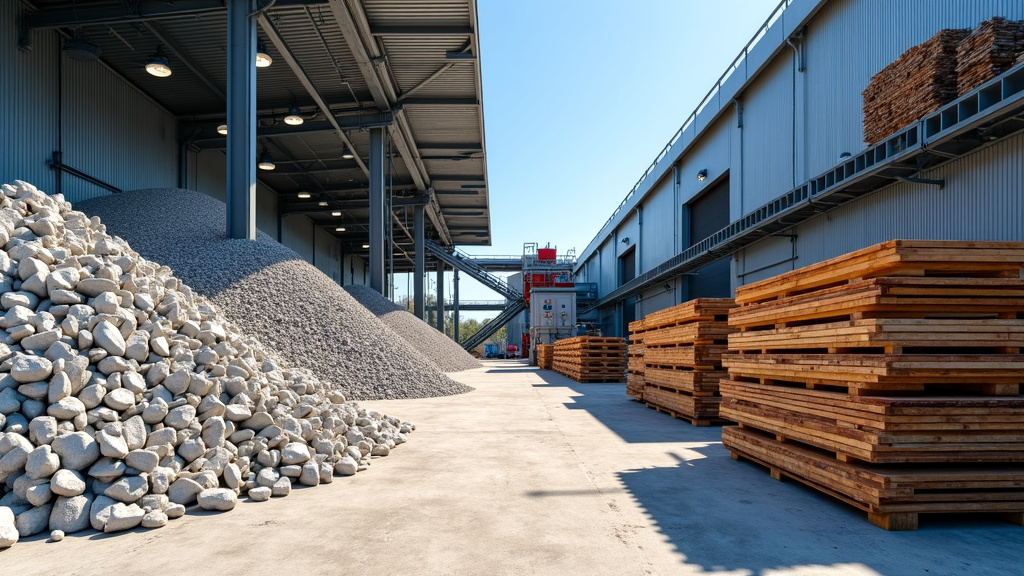5901 Botham Jean Blvd, Dallas, TX 75215
Construction Waste Management: Building a Sustainable Future
April 5, 2025Did you know that the global construction industry generates around 1.3 billion tons of waste annually? This statistic highlights the critical importance of construction waste management in our resource-constrained world. As urban development continues to grow, the need to reduce, reuse, and recycle construction materials is increasingly urgent.
Construction waste management is not just about keeping job sites tidy; it is a fundamental aspect of sustainable building practices that is reshaping the industry. By focusing on minimizing waste from demolition and construction activities, we are safeguarding the environment while also unlocking significant economic benefits and operational efficiencies.
Imagine a future where every brick, steel beam, and concrete slab is given a second life. This is not a far-fetched dream but an achievable reality through innovative waste management strategies. From high-rise towers in bustling cities to residential developments in suburban areas, the potential for transformation is immense.
Benefits of Effective Construction Waste Management

Implementing robust waste management practices in construction projects yields significant advantages for both the environment and businesses. By prioritizing sustainable waste handling, construction companies can achieve numerous benefits beyond simply reducing waste. Let’s explore some key advantages:
Reduced Environmental Impact
Effective waste management substantially reduces landfill usage. A recent study indicates that construction and demolition activities account for approximately 40% of the total solid waste generated worldwide. By implementing proper waste management techniques, much of this waste can be diverted from landfills.
Diverting construction waste from landfills conserves valuable land resources and mitigates environmental hazards associated with waste decomposition. For instance, reducing organic waste in landfills decreases methane emissions, a potent greenhouse gas contributing to climate change.
Furthermore, effective waste management promotes recycling and reuse of materials, reducing the demand for new raw materials. This conservation of resources helps preserve natural habitats and minimizes the carbon footprint associated with material extraction and processing.
Cost Savings and Improved Profitability
Beyond environmental benefits, effective waste management strategies can lead to substantial cost savings for construction projects. By reducing waste generation and maximizing material reuse, companies can significantly lower expenses on new materials and waste disposal fees.
For example, recycling concrete and using it as aggregate in new construction projects can cut material costs while reducing the need for virgin resources. Similarly, proper sorting and recycling of metals can generate revenue through scrap sales, offsetting waste management expenses.
Moreover, efficient waste management practices often lead to improved overall project efficiency. By streamlining material usage and reducing overordering, companies can optimize their supply chain, leading to fewer delays and reduced storage costs.
Enhanced Site Safety and Productivity
A well-organized waste management system contributes significantly to improved site safety. Clutter-free construction sites with designated areas for waste sorting and storage reduce the risk of accidents and injuries. This enhanced safety environment not only protects workers but also minimizes the potential for costly work stoppages and liability issues.
Additionally, a clean and organized site boosts worker productivity. When materials and work areas are easily accessible and not obstructed by waste, workers can perform their tasks more efficiently, potentially reducing project timelines and labor costs.
Strengthened Corporate Reputation
In an era where environmental consciousness is increasingly valued, companies that demonstrate a commitment to sustainable practices can significantly enhance their corporate reputation. Effective waste management in construction projects showcases a company’s dedication to environmental stewardship, potentially leading to:
- Increased client trust and loyalty
- Improved relationships with local communities and regulatory bodies
- Enhanced competitiveness in bidding processes, especially for projects with sustainability requirements
- Attraction and retention of environmentally conscious employees
Furthermore, companies with strong sustainability credentials may find it easier to secure financing or partnerships, as many investors and stakeholders now prioritize environmental, social, and governance (ESG) factors in their decision-making processes.
Regulatory Compliance and Risk Mitigation
As environmental regulations become increasingly stringent, effective waste management helps ensure compliance with local, national, and international standards. This proactive approach can help companies avoid costly fines, project delays, and reputational damage associated with non-compliance.
Moreover, by staying ahead of regulatory trends, companies can position themselves advantageously for future projects and market opportunities. This forward-thinking approach to waste management can serve as a competitive differentiator in an increasingly environmentally conscious construction industry.
Overall, the benefits of effective construction waste management extend far beyond simple waste reduction. From environmental conservation and cost savings to enhanced safety and corporate reputation, the advantages are both numerous and significant. As the construction industry continues to evolve, companies that prioritize sustainable waste management practices will likely find themselves better positioned for long-term success and profitability.
Best Practices for Construction Waste Management

Effective waste management is essential for enhancing resource efficiency and minimizing the environmental impact of construction projects. By adopting best practices, construction companies can significantly reduce waste generation, increase recycling rates, and lower disposal costs. This guide outlines key strategies for effective waste management on construction sites.
Waste Reduction Planning
The foundation of effective waste management lies in thorough planning before construction begins. This proactive approach can dramatically reduce the amount of waste generated throughout the project lifecycle. Here are essential steps for waste reduction planning:
1. Conduct a waste audit: Begin by analyzing the types and quantities of waste your project is likely to generate. This information will help you develop targeted strategies for waste reduction and recycling.
2. Set clear goals: Establish specific, measurable targets for waste reduction and recycling. For example, aim to reduce overall waste by 20% and recycle or reuse at least 50% of construction debris.
3. Develop a comprehensive waste management plan: Create a detailed plan that outlines waste reduction strategies, recycling procedures, and disposal methods for various materials. Ensure all team members are familiar with and committed to following this plan.
On-Site Sorting and Segregation
Effective on-site waste sorting is crucial for maximizing recycling opportunities and minimizing contamination. Implement the following practices to improve sorting efficiency:
- Set up designated collection areas: Create clearly labeled bins or containers for different waste streams such as wood, metal, concrete, plastics, and mixed recyclables.
- Train workers: Provide comprehensive training to all site personnel on proper waste sorting procedures and the importance of waste management. Regular refresher sessions can help maintain awareness and compliance.
- Use color-coding systems: Implement a color-coded system for waste containers to make sorting more intuitive and reduce errors. For example, use blue for metal, green for wood, and gray for mixed recyclables.
Proper Material Storage and Handling
Minimizing material damage and waste through proper storage and handling is an often-overlooked aspect of waste management. Consider these strategies:
- Implement Just-In-Time (JIT) delivery: Coordinate material deliveries to arrive only when needed, reducing the risk of damage during on-site storage. This approach also helps minimize excess ordering.
- Create protected storage areas: Designate weather-protected areas for storing materials, particularly those susceptible to damage from moisture or temperature fluctuations.
- Use proper handling techniques: Train workers on correct material handling procedures to prevent damage and waste. This includes using appropriate equipment and following manufacturer guidelines.
Partnering with Recycling Facilities
Establishing strong partnerships with local recycling facilities is crucial for maximizing waste diversion. Follow these steps to develop effective recycling partnerships:
1. Research local options: Identify recycling facilities in your area that can handle construction and demolition waste. Look for facilities that offer a wide range of recycling services.
2. Establish relationships: Reach out to recycling facilities early in the project planning phase. Discuss your waste management goals and explore how they can support your efforts.
3. Coordinate logistics: Work with recycling partners to establish efficient collection and transportation procedures. This may include scheduling regular pickups or arranging for on-site processing equipment.
By implementing these best practices, construction companies can significantly improve their waste management processes, leading to reduced environmental impact and potential cost savings. Remember, successful waste management requires ongoing commitment and continuous improvement. Regularly review and refine your strategies to achieve optimal results. For more information on construction waste management, visit the EPA’s Sustainable Management of Construction and Demolition Materials page.
Regulations and Compliance in Construction Waste Management
Construction companies must navigate a complex web of regulations for managing waste on their project sites. Local, state, and federal agencies all oversee how construction debris is handled, recycled, and disposed of. Complying with these requirements is crucial for maintaining environmental responsibility and avoiding costly penalties.
At the federal level, the Resource Conservation and Recovery Act (RCRA) establishes the baseline for managing hazardous and non-hazardous solid waste. This law authorizes the Environmental Protection Agency (EPA) to control hazardous waste from cradle-to-grave, including generation, transportation, treatment, storage, and disposal.
State regulations often build upon federal standards, sometimes imposing stricter requirements. For instance, California’s Green Building Standards Code (CALGreen) mandates that at least 65% of non-hazardous construction and demolition waste be recycled or salvaged, exceeding federal minimums and reflecting the state’s commitment to sustainability in the building sector.
Key Areas of Regulatory Focus
Regulations in construction waste management typically focus on several key areas. Proper waste classification is crucial, as different waste types require specific handling and disposal methods. Hazardous materials like asbestos or lead-based paint are subject to stringent rules to protect worker and public health.
Disposal sites are another critical concern. Many jurisdictions require construction companies to use only approved facilities for specific waste types. Using unauthorized dumping sites can result in hefty fines and potential legal action. Local authorities may conduct spot checks or require documentation proving proper disposal.
Documentation and record-keeping form another pillar of regulatory compliance. Construction firms must maintain detailed logs of waste generation, transportation, and disposal. These records serve as proof of compliance and may be audited by regulatory agencies. Implementing a robust system for tracking waste streams can prevent future issues.
Strategies for Ensuring Compliance
Staying on top of waste management regulations requires a proactive approach. Many construction companies designate a compliance officer or team responsible for monitoring regulatory changes and updating internal policies. Regular training sessions for staff can help ensure everyone on the job site understands their role in maintaining compliance.
Technology can be a valuable ally in managing regulatory requirements. Construction management software often includes features for tracking waste generation and disposal, making it easier to generate the reports required by various agencies. Some platforms even offer real-time updates on changing regulations, helping companies stay ahead of the curve.
Partnering with reputable waste management companies can also streamline compliance efforts. These specialists stay up-to-date on regulatory requirements and can often handle much of the paperwork and logistics involved in proper waste disposal. However, the ultimate responsibility for compliance still rests with the construction company.
The Benefits of Going Beyond Compliance
While meeting regulatory minimums is essential, many forward-thinking construction firms find value in exceeding these standards. Implementing comprehensive recycling programs or adopting innovative waste reduction techniques can lead to cost savings and improved public perception. Some municipalities and clients even offer incentives for projects that demonstrate exceptional environmental stewardship.
Moreover, as sustainability becomes increasingly important in construction projects, companies with strong waste management practices may gain a competitive edge. Many clients, particularly in the public sector, now include waste diversion rates and environmental responsibility as criteria in their bid evaluation processes.
Ultimately, viewing waste management regulations not as a burden but as an opportunity for innovation can lead to better outcomes for construction companies, their clients, and the environment. By staying informed, leveraging technology, and fostering a culture of compliance, firms can navigate the regulatory landscape while building a reputation for responsible construction practices.
| State | Regulation Status | Additional Categories |
|---|---|---|
| California | Similar to federal, with additional requirements | Electronic Devices, Cathode Ray Tubes, Photovoltaic modules |
| Rhode Island | Similar to federal, except aerosol cans not included | Used electronics, Silver-containing photo fixing solutions |
| Vermont | Includes additional waste characteristics | PCB-containing fluorescent light ballasts, Cathode Ray Tubes, Postconsumer paint |
| Texas | Similar to federal, except aerosol cans not included | Paint and paint-related waste |
How Okon Recycling Can Help with Construction Waste Management

Construction projects generate substantial waste, posing significant environmental challenges. Fortunately, companies like Okon Recycling are addressing this issue directly. With over a century of experience in the recycling industry, Okon offers specialized solutions for construction waste management.
Okon’s state-of-the-art facilities efficiently handle a wide range of construction materials. From concrete and masonry to wood, metals, and drywall, their advanced recycling technologies ensure valuable resources are recovered and repurposed rather than ending up in landfills.
What sets Okon apart is their commitment to sustainability. They transform waste into valuable resources for future projects, reducing the environmental footprint of construction activities and helping companies comply with stringent regulations.
Innovative Approaches to Construction Material Recycling
Okon’s innovative recycling techniques go beyond simple sorting and crushing. They employ cutting-edge technologies to maximize resource recovery. For instance, their concrete recycling process not only crushes old concrete but also separates reinforcing steel, ensuring both materials can be fully utilized.
Their wood recycling program is equally impressive. Untreated wood is chipped for landscaping or animal bedding, while treated wood is processed into fuel for power generation. This versatility ensures virtually no wood waste ends up in landfills.
Metal recycling, a cornerstone of Okon’s services, is crucial in construction waste management. Their advanced sorting and processing techniques allow for the recovery of various metals, from structural steel to copper wiring, all of which can be melted down and reused in new construction projects.
Building a Greener Future Through Smarter Waste Management
As the construction industry continues to expand, the responsibility to manage waste sustainably has never been more critical. Effective construction waste management isn’t just a regulatory requirement—it’s a strategic advantage that drives environmental, operational, and financial gains.
From reducing landfill impact and lowering material costs to improving site safety and enhancing corporate reputation, the benefits of smart waste management are clear. By embracing best practices and working with experienced partners like Okon Recycling, construction companies can lead the charge toward a more sustainable future.
The path forward is one of innovation, responsibility, and long-term thinking. Let every load of concrete, every scrap of metal, and every wood offcut be seen not as waste—but as opportunity. The buildings of tomorrow begin with the materials we choose to preserve today.
To learn more about implementing effective waste management solutions in your construction projects, contact Okon Recycling at 214-717-4083.
